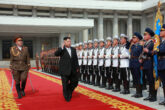March 28, 2024
Don’t Betray the Women of Afghanistan
Normalizing Relations With the Taliban Normalizes Female Suffering
A human rights calamity is unfolding in Afghanistan. Since retaking power in mid-2021, the Taliban have implemented more extreme policies against women than any other regime in the world. Taliban leaders have issued over 90 edicts limiting women’s rights: they have banned women and girls from attending university or school beyond the sixth grade, restricted their access to health care, prohibited them from leaving home without a male guardian, and revoked many of their social and legal protections. Every new restriction on Afghan women strengthens the Taliban’s dictatorial grip on the entire Afghan population and feeds extremism in a society already occupied by dozens of terrorist groups. Although the Taliban are fighting the terrorist group known as Islamic State Khorasan (ISIS-K), they allow some 20 other terrorist groups to operate freely in Afghan territory.
Normalizing relations with the Taliban before they reverse their anti-women policies would amount to pretending as if those two decades of progress never happened.
Yet even though Afghanistan is the only country in the world that prohibits women’s education, some analysts are urging the United States to normalize ties with the Taliban, including by reopening a U.S. embassy in the country. These proponents argue that by doing so, Washington would improve its ability to monitor assistance programs and engage with Taliban leaders in the country, including to press them to moderate their policies. But taking steps to normalize relations with the Taliban before their leaders halt their systematic persecution of women would be a gross betrayal of the millions of women and girls whose lives the United States helped to transform over two decades. During the Taliban’s previous stint in power, from 1996 to 2001, they closed schools to girls, forbade women to work, and targeted women with extreme forms of punishment, including public floggings and executions.
Read the full article from Foreign Affairs.
More from CNAS
-
Trump’s Audacious Success
This article was originally published in The Atlantic. Nicolás Maduro and his wife awoke yesterday in a safe house on a heavily fortified military base in the center of Caraca...
By Richard Fontaine
-
North Korea and Russia’s Deepening Axis
2025 was the year North Korea turned a corner, not just through provocations, but by actively repositioning itself in the global power game. Its military partnership with Russ...
By Dr. Go Myong-Hyun
-
CNAS Insights | Eight Things to Watch for in 2026
Buckle up for a pivotal geopolitical year. In 2026, the world will struggle to make sense of U.S. actions and intentions, and Washington will remain uncertain about its own pl...
By Richard Fontaine
-
North Korea in Motion: New Moves, Sharper Risks, and Shifting Regional Responses
As 2025 winds down, tensions on the Korean Peninsula are escalating once again.North Korea is sending thousands of workers to Russian drone factories, stepping up cyber theft ...
By Dr. Go Myong-Hyun




